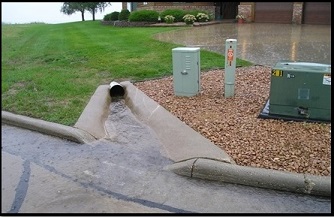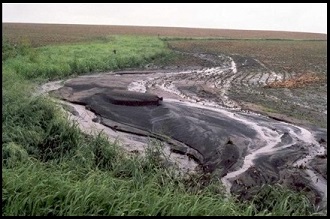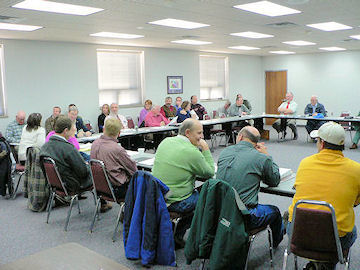Watershed Protection
IN SOUTH DAKOTA
About Nonpoint Source Pollution Program


Nonpoint source pollution can come from many sources.
What is nonpoint source pollution?
Nonpoint source pollution and natural sources are leading causes of pollution in South Dakota. Runoff from agricultural areas, construction sites, urban areas, mining, and silviculture can carry pollutants produced by those activities into South Dakota’s lakes and streams. According to the 2024 Integrated Report for Surface Water Quality, 78.1% of the assessed stream miles did not support one or more beneficial uses.
What is the South Dakota Nonpoint Source Program?
The South Dakota Nonpoint Source Pollution (NPS) Program is run by SD Department of Agriculture and Natural Resource’s Watershed Protection Program. NPS pollution activities coordinated by program staff are selected to improve, restore, and maintain the water quality of the state’s lakes, streams, wetlands, and ground water in partnership with other organizations, agencies, and citizens.
South Dakota uses voluntary measures for the implementation of Best Management Practices (BMPs) to control NPS pollution. The Clean Water Act Section 319 program is the focus for a majority of the existing NPS control programs. For more than 25 years, the 319 Program has been developing and implementing watershed restoration projects throughout the state.
Nonpoint Source Pollution Program Annual Reports
2024
2023
2022
2021
2020
2019
2018
2017
2016
2015
2014
2013
2012
2011
2010
2009
2008
2007
2006
2005
2004
2003
2002
2001
2000
Nonpoint Source Management Plan
Nonpoint Source Management Plan
What can I do?
As a landowner, producer, or citizen an practices implemented that slow or reduce runoff water entering a waterbody will help reduce nonpoint source pollution. Runoff carries sediment and other pollutants and is most problematic during times of high precipitation or snowmelt. In urban areas, hard surfaces like pavement contribute to runoff. In agricultural and natural areas bare uncovered ground contributes to runoff and to soil erosion. Slowing water and reducing runoff can be accomplished by planting or preserving vegetation along stream banks, keeping soil covered and maintaining healthy soil, and reducing disturbances in those areas.
Landowners, producers, and citizens can also check to see if there is an active project in their area that may provide financial and technical assistance in improving water quality.
South Dakota Nonpoint Source Task Force
Next meeting: 10:00am December 8th, 2025
Agenda items: Meeting Agenda
Live stream: Livestream Recording

The South Dakota Nonpoint Source Task Force (NPSTF) was formed in 1988 to assist and advise the South Dakota Department of Agriculture and Natural Resources (SD DANR) with the implementation of the Nonpoint Source (NPS) provisions of the Clean Water Act. Task Force activities are coordinated by the SD DANR Watershed Protection Program Nonpoint Source staff. Final responsibility for the NPS program rests with the department.
Responsibilities
To accomplish its mission the Task Force was assigned the seven primary responsibilities listed below:
- Provide a forum for the exchange of information on activities which impact nonpoint source pollution control;
- Prioritize waterbodies for nonpoint source control activities;
- Provide guidance and application procedures for funding of nonpoint source control projects and review and recommend for approval project funding proposals which request funds under sections 604(b) or 319 of the Clean Water Act;
- Serve as the coordinating body for the review and direction of federal, state and local government programs to assure that the programs allow achievement of nonpoint source pollution control in the most efficient manner;
- Serve as a focal point for information, education and public awareness regarding nonpoint source pollution control;
- Provide oversight of nonpoint source control activities and prioritize the activities; and
- Provide a forum for discussion and resolution of program conflicts.
Task Force Chairman
The current NPSTF chairman is Mr. Jay Gilbertson. Jay is manager of the East Dakota Water Development District, which is located in Brookings, SD.
The Task Force has adopted a program neutral philosophy for planning and implementing NPS pollution strategies needed to meet these responsibilities. Under this philosophy, causes rather than ownership of pollution sources are addressed. All of the resources that might be used to resolve the issues are brought to the table.
Program neutral planning and implementation are fostered through the Task Force's membership policy. All agencies and interest groups in South Dakota with either land management responsibilities or programs that effect the causes or control of NPS pollution are invited to request Task Force membership. More than 20 agencies and interest groups constitute the Task Force membership. In addition to member representatives over 75 individuals from the member agencies and groups and other nonmembers frequently participate in Task Force activities.
The frequency of Task Force meetings is determined by issues that need to be addressed. Committees formed to work with specific NPS priority issues meet throughout the year and report to the Task Force at scheduled meetings.
For more information on the NPS Task Force and scheduled meetings, please contact the SD DANR Watershed Protection Program at (605)773-3623.